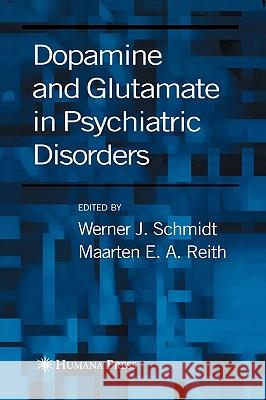Dopamine and Glutamate in Psychiatric Disorders » książka



Dopamine and Glutamate in Psychiatric Disorders
ISBN-13: 9781588293251 / Angielski / Twarda / 2005 / 600 str.
Dopamine and Glutamate in Psychiatric Disorders
ISBN-13: 9781588293251 / Angielski / Twarda / 2005 / 600 str.
(netto: 969,94 VAT: 5%)
Najniższa cena z 30 dni: 771,08
ok. 10-14 dni roboczych.
Darmowa dostawa!
covers dopamine and glutamate neurotransmission in psychiatric diseases in a contributed
"...offers an excellent review of our understanding of how dopamine and glutamate influence the pathophysiology of psychiatric disease...an impressive effort, and every psychiatrist (and neurologist) should have this book in their reference library." - 4 Stars, Doody's Health Sciences and Book Review Journal
Part I. Dopamine Dopamine Receptors Kim A. Neve Dopamine Receptor Alternative Splicing Neil M. Richtand, Laurel M. Pritchard, and Lique M. Coolen Part II. Glutamate Glutamatergic Pathways: Their Relevance for Psychiatric Diseases Yoland Smith Glutamate Receptors: Ionotropic Daniel T. Monaghan, Julia C. A. More, Bihua Feng, and David E. Jane Metabotropic Glutamate Receptors Krystyna Ossowska Part III. Schizophrenia Dopamine and Schizophrenia Bart A. Ellenbroek Glutamate and Schizophrenia and the N-Methyl-d-Aspartate Receptor Hypofunction Hypothesis Stefan Bleich and Johannes Kornhuber Role of Glycine in Schizophrenia Beate D. Kretschmer Part IV. Depression Dopamine and Depression Phil Skolnick Glutamate and Depression Joaquín Del Río and Diana Frechilla Part V. Stress and Aggression Dopamine, Glutamate, and Aggression Klaus A. Miczek and Eric W. Fish Part VI. Anxiety Glutamatergic Systems and Anxiety David N. Stephens Part VII. Attention Deficit Hyperactivity Disorder Dopamine and Glutamate in Attention Deficit Hyperactivity Disorder James M. Swanson, Nora D. Volkow, Jeffrey Newcorn, B. J. Casey, Robert Moyzis, David K. Grandy, and Michael I. Posner Part VIII. Addiction Dopamine-Glutamate Interactions in Reward-Related Incentive Learning Richard J. Beninger and Todor V. Gerdjikov Sensitization and Relapse: Dopamine-Glutamate Interactions David A. Baker and Peter W. Kalivas Glutamatergic Neurotransmission in Sensitization Thomas M. Tzschentke Glutamatergic Mechanisms of Drug Relapse: Withdrawal and Conditioning Factors Anton Y. Bespalov and Robert L. Balster Part IX. Neurodegeneration Dopamine andNeurodegeneration Gabriele Gille and Peter Riederer Glutamate and Neurodegeneration Antonello Novelli, Marcos Pérez-Basterrechea, and Maria Teresa Fernández-Sánchez Part X. Parkinson's Disease Presymptomatic and Symptomatic Stages of Intracerebral Inclusion Body Pathology in Idiopathic Parkinson's Disease Heiko Braak and Kelly Del Tredici Dopamine and Glutamate in Parkinson's Disease: Biochemistry, Clinical Aspects, and Treatment Heinz Reichmann, Bernd Janetzky, and Peter Riederer Dopamine and Glutamate in Motor and Cognitive Symptoms of Parkinson's Disease Werner J. Schmidt Part XI. Huntington's Disease Dopamine and Glutamate in Huntington's Disease Carlos Cepeda, Marjorie A. Ariano, and Michael S. Levine Part XII. Dementias Dopaminergic and Glutamatergic Systems in Alzheimer's Disease Paul T. Francis Index
Continous rigorous research in basic neurosciences and in clinical studies has enormously increased our knowledge of the neurobiological basis of mental functions and of the neuronal dysfunctions underlying such diseases as schizophrenia, depression, attention deficit disorder, and Parkinson's disease. A transmitter system does not work in isolation, it interacts with other transmitters and the balance between several transmitter determines the outcome, either physiological or pathological. Such a critical balance exists between dopamine and glutamate, which in many brain areas play functionally opposing roles. In Dopamine and Glutamate in Psychiatric Disorders, a panel of neurochemists, pharmacologists, experimental psychologists, and clinicians summarizes our current understanding of the interactive role of dopamine and glutamate in psychiatric diseases and from that develops novel therapeutic strategies and possibilities for the future. Among the new ideas presented are hypotheses on the role of dopamine and glutamate in aggression, the glutamate system in anxiety disorders, glutamate and neurodegeneration, on the origin, progression, and cognitive aspects of Parkinson's disease. Additional chapters offer illuminating insights into a variety of psychiatric diseases, including attention deficit hyperactivity disorder, stress, aggression, addiction, schizophrenia, depression, social phobias, dementias, bulimia, and neurodegenerative diseases like Parkinson's and Alzheimer's diseases. Each chapter summarizes the prevalence and symptoms of the disease and explains the involvement of dopamine and/or glutamate systems using the newer molecular approaches such as transgenic knockout or knockin mice and recent brain imaging techniques. The authors also offer a critical selection and evaluation of relevant literature and a description of future directions for new therapy development.
Path-breaking and insightful, Dopamine and Glutamate in Psychiatric Disorders offers behavioral pharmacologists, neurobiologists, and clinicians an enlightening review of the neurobiological basis and treatment strategies of today's most important psychiatric and neurological diseases.
1997-2026 DolnySlask.com Agencja Internetowa
KrainaKsiazek.PL - Księgarnia Internetowa









